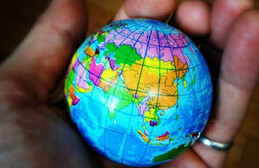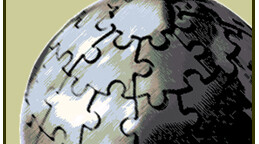Globalization, broadly defined, seemingly has the effect of both drawing attention to the common global challenges that humanity faces while, simultaneously, causing some to feel threatened and to retreat into more narrowly defined identity groups. One can see these opposing trends in the transnational movements for human rights, social justice, and environmental protection on the one hand, versus a proliferation of nationalist causes and self-determination movements on the other. With identities constantly shifting around affiliations at global and national levels, it is important to contemplate the implications of these trends. Or, more broadly, the role of the nation-state in a a globalizing world.
And that is not a new debate. Authors from Richard Rosecrance to Robert Kaplan alternately point to both optimistic and gloomy scenarios over the changing nature of the nation-state in a more interdependent era. At one extreme, there are a variety of recent writers and thinkers who have predicted the "death of the nation-state." This view is based, in part, on the lessening control the nation-state has over autonomous actors (i.e. terrorist networks), as well as its diminishing power vis-à-vis economic and cultural affairs.
Some claim that more globally oriented solutions, and more effective institutions at the global level, are needed for an increasing array of global problems that cannot be solved at the level of the nation-state. Alternatively, there are those who claim that the nation-state is the highest and best form of political organization and is linked with the formation of more stable, liberal democracies. Those in this latter camp largely reject more globally oriented perspectives and, believing in a political philosophy of competing nation-states, adhere to a doctrine of national interest.
I would argue that, while national affiliations have an important place, an over-attachment to this framework—made in the context of policy decisions on a daily basis—will, ultimately, handicap progress at multiple levels. One way to bridge the age-old divide between the philosophies of globally oriented "idealism" and nation-state "realism" is to look at world affairs today in a more nuanced perspective, i.e. to recognize that the development of the nation-state has reflected a key step in the advancement of civilization as part of an evolving process.
From this perspective, one can appreciate how larger and larger groups of people have learned how to organize and govern themselves at the levels of the tribe, city-state, tribal confederation, empire, and now the modern nation-state. The formation of nation-states has played an important role in uniting disparate social groups under a common banner and cause. The mixture of ethnic, racial, and religious groups living in the United States, who owe allegiance to common symbols and a common system of government, is a case in point. The dysfunction of today's divisive and partisan politics aside, the United States as a nation-state has largely been successful, one can argue, because of both its federal structure and a value system that has welcomed people from diverse backgrounds who have come together to advance common goals. It is a rich, and important, heritage.
And, despite globalizing trends that have eroded many sovereign-states' political borders, the nation-state is still the key political construct under which the majority of human beings are governed. As such, its role is vital and there is a place for a sane and balanced patriotism. An over-attachment to the nation-state concept does, however, run the risk of failing to meet the needs of a rapidly changing time in human history that is characterized by increasing global needs and interdependencies.
From an ethical perspective, too, national attachments can promote immoral behavior if and when they blind citizens to the terrible atrocities that have been committed in their name. Without repeating that history here, one can point to the horrors of the two world wars and, in the more recent past, to the genocide in Rwanda, the nationalist fervor leading to the atrocities in the Balkans, and both the Palestinian and Israeli nationalism that have led, in part, to that protracted conflict. The list of atrocities committed in the name of a nation-state is a very long one.
An attachment to singular or narrowly construed identity groups is understandable when seen in the context of the insecurity caused by the many social, economic, and political changes that the world now faces. The rise of far right nationalist movements in Europe during a period of austerity is a case in point. These attitudes may be understandable, but are clearly problematic when such sentiments cross the line into violence. Furthermore, they can create ongoing conflict cycles. As Dr. Louis Kriesberg at Syracuse University notes, "The enduring identities of ethnic groups, identities that are non-compromising, identities built on viewing an enemy as subhuman, or identities associated with nationalist sentiments are among identity formations that can keep conflicts going."
While identity conflicts, especially over national and ethnic divides, seem to be proliferating at one level, there are also trends in the other direction, i.e. towards a broadening of identity beyond the confines of a nation-state. (See Devin Stewart's further analysis of changing definitions of the nation-state in Carnegie Council's August 2008 Roundtable.) Of course, people have multiple and overlapping identities, which may range from an attachment to an ethnic or religious group, a local community, tribe, a nation-state, a region, or, more than likely, a combination of a number of these. However, as globalization trends accelerate and people constantly move and travel from one country to another, there are an increasing number of people who do relate to a global identity—whether or not there is a legal entity to attach that affinity to.
Those with this broader, global worldview understand that global problems—from climate change to energy needs to crime syndicates to natural disasters to income inequality—increasingly call for more collaborative solutions. The nation-state has a vital role to play in this process, but attachments to national ideologies that are both conflict-centered and inherently exclusionary and inward-looking are not only likely to keep much of humanity in perpetual conflict cycles, but also to prevent us from meeting the challenges that our era ultimately requires. The solution is not an either/or approach, but one that places the nation-state on a much wider canvas.
To ensure that nation-states can meet the complex, multi-layered challenges that confront them requires, firstly, updating values, policies, and institutions. A change in people's minds and hearts is an initial requirement, which is where morality, ethics, and spiritual frameworks that emphasize our common humanity are so vital. This concept is hardly a new one and is advanced by the moral universalism of many religious traditions, as well as by secular thinkers from Socrates to Thomas Paine.
Secondly, institutions at the national level urgently need to be updated to meet the needs of a very different, and far more interdependent, period of human history. The failure of institutions at the level of the nation-state to adopt a broader vision may come at significant costs to those countries that are slow to adapt, including the United States. The need is not for a relinquishment of national identity per se—which would be neither productive nor desirable—but for becoming "unstuck" from the almost sacrosanct nation-state-centered doctrines that undergird policy at multiple levels. To make these arguments more concrete, let's take a closer look at the U.S. educational system and the U.S. military.
Education
Many educators are questioning whether students in America today are being taught the knowledge and skills that are preparing them for the new realities of globalization. As Asia Society remarks in its 2011 report on Educating for Global Competence:
"Contemporary societies are marked by new global trends—economic, cultural, technological, and environmental shifts that are part of a rapid and uneven wave of globalization. The growing global interdependence that characterizes our time calls for a generation of individuals who can engage in effective global problem solving and participate simultaneously in local, national, and global civic life."National and local state history is taught in most U.S. elementary and high schools and this is certainly important, as students need to know something about their own history, values, and national narratives. But is it enough? Although students are likely to have taken a class in world history by the time they leave high school, it seems that even these courses often focus on lists of wars and tales of nation-building. American schools are teaching foreign languages although, for many students, this remains a low priority.
But, beyond languages, what would a more globally aware curriculum look like? There is no universal agreement on what global education should include, but some common themes can be gleaned from emerging dialogues in this field: namely, the need to understand the world as a complex system; the interdependence of global issues; conflict resolution skills; critical thinking; human rights; social/economic affairs; and environmental sustainability. This approach goes far beyond learning about flags, foods, and culture.
Integrating global education across the curriculum is not very advanced to date in most parts of the world, but there are a number of countries in Europe, for example, that are taking it seriously. Entities like the Global Education Network Europe are institutionalizing cooperative efforts. Select educators across the U.S. are advocating for more of an internationalization of the curricula and such programs can increasingly be found at tertiary institutions, but there is no critical mass of support, per se. A very nationalist-centered paradigm seemingly still prevails in textbooks, especially below the college level, and there is a notable lack of political or financial support in national policymaking circles for international education generally.
When advocacy for such an agenda comes up, it is often only in the context of economics, i.e. Americans needing skills for the U.S. to remain "competitive." But, there's much more to the story from a moral point of view. Global education also has to be about learning collaboration skills in a world of great diversity—a hard task perhaps, when so much of what is taught in schools is based on conflict-centered paradigms. So, the question remains whether American students will have the ability to work with others on complex global challenges, or have the worldviews that the new century demands of them.
The Military
Where the U.S. military is concerned, it may be a particularly tall order to suggest that the institution rethink the nationalist mindsets that are part and parcel of its mission. Clearly, the U.S.—and any other nation-state—has an obligation to police its territory and protect its own borders. However, an over-attachment to a nation-state-centered framework in an increasingly multilateral context raises its own share of problems.
For example, it is becoming untenable—both domestically and abroad—for a country like the United States to unilaterally wage war or to use the military to intervene in another sovereign state's affairs without sanction of the United Nations or a regional collective security institution like NATO. Rather, it is now more typical for the U.S. to participate in multilateral "coalitions of the willing" to achieve its aims (such as in Kosovo, Iraq, Afghanistan, and Libya), which requires both the agreement and the political and resource commitments of different nation-states.
Without getting into a lengthy discussion on whether recent interventions have qualified as "just wars," the fact remains that such interventions are handicapped by differences in national training standards and rules of engagement, which can hinder operational effectiveness, prolong a conflict, or result in a defeat of the coalition itself. Separate United States and NATO air tasking orders in the 1999 Kosovo War, for example, led to the misidentification of aircraft and intelligence gaps. Ultimately, even though the goal of getting Serbian national forces out of Kosovo was achieved, the Serbs were able to take advantage of the weaknesses they saw in coalition operations. Similarly, in Afghanistan and Iraq, insurgents have exploited the seam lines created in the different rules of engagement that different nation-states have applied.
The world remains a dangerous place and nation-states will increasingly need to work together to counter extremist factions, criminal networks, and armed gangs that terrorize hapless populations. Coalition operations of the future will likely consist of irregular warfare, counter-insurgency operations, humanitarian interventions, peace enforcement operations, and peacekeeping missions. In such situations, diverse rules and standards created by different nation-states is a recipe for chaos and will both continue to plague coalition military efforts and erode an essential unity of command.
Despite efforts by entities like NATO to increase and standardize military professionalism, serious problems remain and will continue to do so until there is willingness for countries like the United States to detach from a "my way or the highway" approach to foreign and defense policy, as well as a maturation of collective security institutions. It's unclear what form these institutions may ultimately take, but, far from writing them off as a "globalist conspiracy," it is in everyone's interest to ensure they are effective.
Conclusion
Whether the issue is education, the military, or many other policy arenas not touched on in this essay, the challenge is not to take an either/or view about the role of the nation-state vis-à-vis global trends, but to understand how the nation-state fits in an evolving global society, and to adapt our mindsets and institutions accordingly to meet the increasingly urgent needs of our time.


